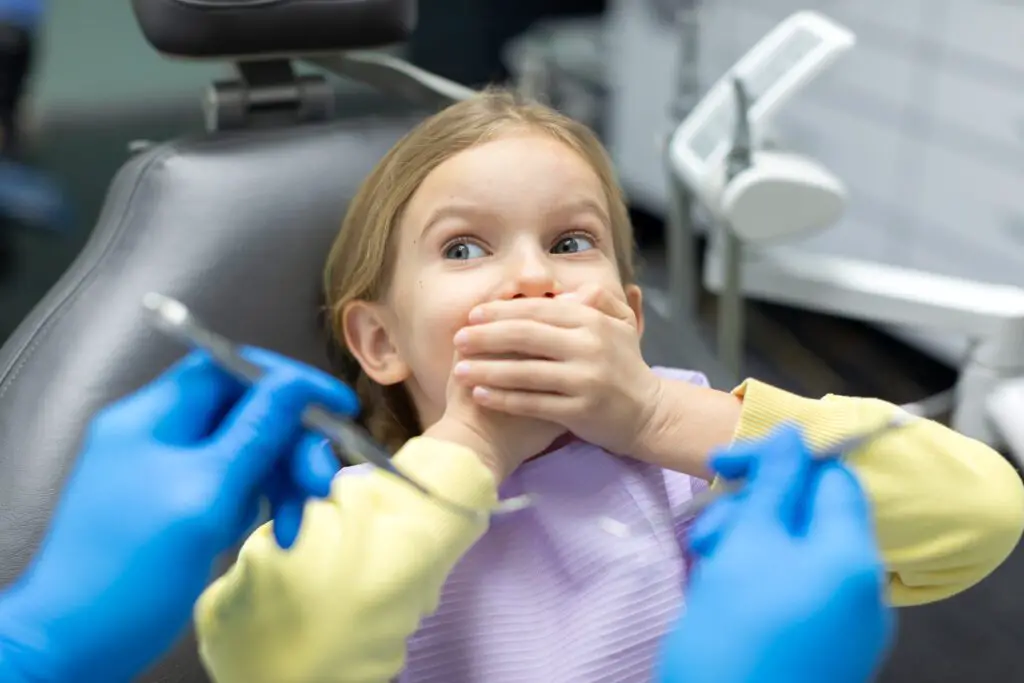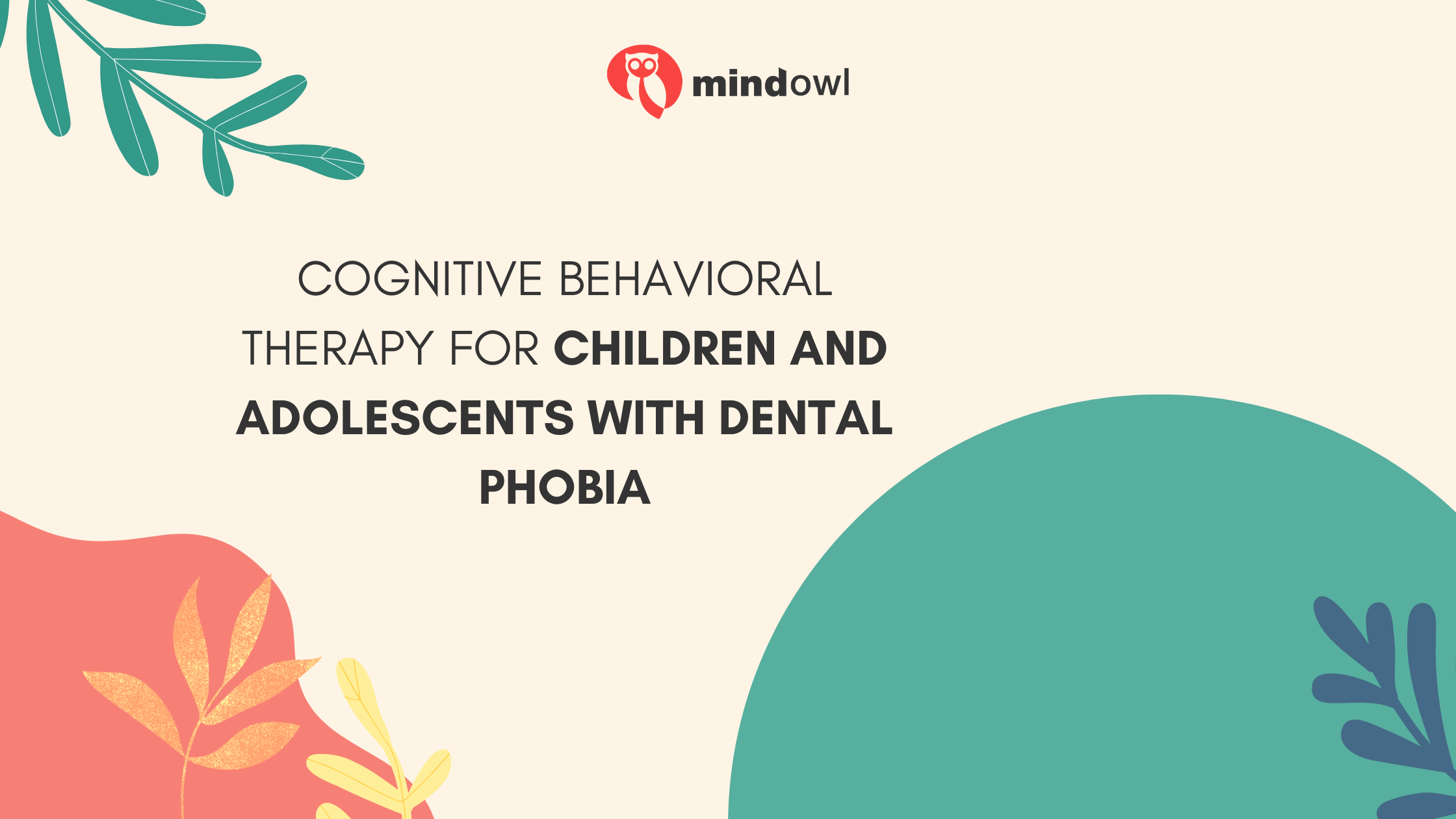Key Takeaways
- Dental phobia is a common but treatable condition that can affect children’s oral and overall health.
- Cognitive Behavioral Therapy (CBT) is a proven approach to help children overcome dental anxiety.
- Parents play a crucial role in supporting their child’s CBT journey and managing their own anxieties.
- CBT techniques for dental phobia include identifying and challenging negative thoughts, gradual exposure, relaxation techniques, and positive reinforcement.
- Preparing for dental visits with CBT strategies like familiarization visits, the ‘tell-show-do’ technique, and distraction can make appointments less stressful.
Is your child afraid of the dentist? Do trips to the dental clinic trigger tears, tantrums, or outright refusal? You’re not alone. Dental phobia is a common issue in children and adolescents, often leading to missed appointments and neglected oral health. But there’s hope. Cognitive Behavioral Therapy (CBT), a proven psychological approach, has emerged as a powerful tool to help young people overcome their fear and build a positive relationship with dental care. In this article, we’ll explore how CBT works and why it’s making a difference for countless families facing dental anxiety.

What Exactly Is Dental Phobia?
Dental phobia is more than just feeling a little nervous before a checkup. It’s an intense, often irrational fear of dentists and dental procedures. This fear can manifest in many ways, from mild nervousness to full-scale panic attacks. Common signs include:
- Physical Symptoms: Rapid heartbeat, sweating, shaking, nausea, or even fainting at the thought of a dental visit.
- Emotional Distress: Extreme anxiety, crying, irritability, or difficulty sleeping in the days leading up to an appointment.
- Avoidance: Refusing to go to the dentist altogether, leading to neglected oral health and potential dental problems.
Triggers of Dental Anxiety
For many children and teenagers, dental anxiety stems from specific triggers, such as:
- Fear of Pain: Worries about needles, drills, or the discomfort associated with certain procedures.
- Negative Past Experiences: A traumatic dental visit or a painful procedure can create lasting fear.
- Feeling of Helplessness or Lack of Control: The unfamiliar environment, the reclining chair, and the feeling of being ‘trapped’ can be overwhelming for some young patients.
- Sensory Sensitivities: Bright lights, loud noises, and certain smells in the dental clinic can be overwhelming for children with sensory processing issues.
It’s important to distinguish between general anxiety and specific dental phobia. While general anxiety can contribute to dental fear, dental phobia is a distinct condition characterized by an intense and persistent fear of dental situations. If your child’s fear is significantly interfering with their ability to receive dental care, it’s crucial to seek professional help.
Your Crucial Role as a Parent or Guardian
Your support is instrumental in your child’s journey to overcome dental phobia. Here’s how you can actively participate in their CBT process:
- Be a Positive Role Model: If you exhibit anxiety about dental visits, your child is likely to mirror those feelings. Demonstrate a calm and confident attitude toward dental care, both in your words and actions.
- Open Communication: Talk openly with your child about their fears and concerns. Validate their feelings and reassure them that it’s normal to feel anxious. Avoid dismissing their fears or forcing them into situations that overwhelm them.
- Encourage Participation: Involve your child in the CBT process. Help them understand the therapy goals and encourage them to practice the relaxation and coping techniques they learn. Celebrate their successes, no matter how small.
- Practice Relaxation Techniques Together: CBT often incorporates relaxation techniques like deep breathing exercises and progressive muscle relaxation. Practice these techniques together with your child to create a calming and supportive environment.
- Partner with the Therapist: Maintain open communication with your child’s therapist. Share any observations or concerns you have, and work together to create a consistent and positive approach to dental care.
- Choose a Supportive Dental Team: Finding a compassionate and child-friendly dental team can make a world of difference. Look for dentists and hygienists who are experienced in working with anxious children. Finding a reliable healthcare provider can be challenging, but I feel fortunate to have found my local Chestnut Hill dentist who prioritizes patient comfort.
- Manage Your Own Anxieties: It’s natural for parents to feel anxious about their child’s dental phobia. If you’re struggling with your own anxieties about dental care, consider seeking support for yourself. Remember, a calm and confident parent can significantly impact a child’s ability to cope with their fears.
The Ripple Effects of Dental Phobia
Dental phobia isn’t just an inconvenience; it can have significant consequences for your child’s oral and overall well-being. Here’s why it’s crucial to address dental anxiety early on:
Short-Term Consequences:
- Missed Appointments and Delayed Treatment: Children with dental phobia often miss routine checkups and avoid necessary treatments. This can lead to the progression of dental problems that could have been easily prevented or managed with early intervention.
- Increased Dental Anxiety: Each avoided visit can reinforce the fear and make it even more difficult to seek dental care in the future.
- Emergency Dental Visits: When dental problems are left untreated, they can escalate into painful emergencies, requiring more extensive and invasive procedures, further exacerbating dental anxiety.
Long-Term Consequences:
- Poor Oral Health: Untreated dental issues can lead to tooth decay, gum disease, and even tooth loss. This can affect a child’s ability to eat, speak, and smile confidently.
- Increased Risk of Systemic Health Problems: Research suggests a link between poor oral health and various systemic conditions, including heart disease, diabetes, and respiratory problems. Addressing dental phobia can help mitigate these risks.
- Social and Psychological Impact: Dental phobia can negatively impact a child’s self-esteem, social interactions, and overall quality of life. They may feel embarrassed about their teeth, avoid smiling, or experience social isolation due to their fear.

Empowering Your Child with CBT Techniques
Cognitive Behavioral Therapy (CBT) equips children and adolescents with a toolbox of practical skills to manage anxiety and face their dental fears. Here are some key techniques that therapists may use:
- Identifying and Challenging Negative Thoughts: Children learn to recognize unhelpful thoughts like ‘This is going to hurt’ or ‘I can’t handle this.’ They then learn to challenge these thoughts with more realistic and positive statements, such as ‘The dentist will be gentle’ or ‘I can do this if I stay calm.’
- Gradual Exposure: This involves gradually exposing the child to feared dental situations in a safe and controlled environment. It might start with simply sitting in the dental chair, then progress to holding dental instruments, and eventually undergoing simple procedures.
- Modeling: Therapists may demonstrate coping skills and model calm behavior during dental procedures. This can help children learn by example and feel more at ease.
- Relaxation Techniques: Deep breathing exercises, progressive muscle relaxation, and mindfulness techniques can help children reduce anxiety and stay calm during dental visits. Therapists teach children how to use these techniques effectively.
- Positive Reinforcement: Therapists and parents provide positive feedback and rewards for brave behavior. This encourages children to continue practicing their coping skills and builds confidence.
CBT for children and adolescents is adapted to their developmental level and interests. Therapists use age-appropriate language, engaging activities, and games to make the process fun and interactive. They may also incorporate stories, role-playing, and creative expression to help children understand and manage their anxiety.
Getting Ready for the Dentist
Preparing your child for a dental visit doesn’t have to be a struggle. With CBT-inspired strategies, you can transform anxiety into anticipation. Try these practical steps:
- Familiarization Visits: Arrange short, non-invasive visits to the dental clinic before any actual procedures. This allows your child to become comfortable with the environment, meet the dental team, and sit in the dental chair without feeling pressured.
- ‘Tell-Show-Do’ Technique: Dentists often use this approach to introduce procedures. They tell your child what will happen, show them the instruments (in a non-threatening way), and then do the procedure. This reduces surprise and builds trust.
- Positive Reinforcement and Rewards: Create a reward system for brave behavior during dental visits. It could be a small toy, a special outing, or extra screen time. This reinforces positive associations with dental care.
- Visual Aids and Social Stories: Use age-appropriate books, videos, or social stories to explain dental procedures in a fun and engaging way. These tools can help children understand what to expect and reduce anxiety.
- Distraction Techniques: Bring along your child’s favorite toy, book, or electronic device to help them stay distracted and relaxed during the visit. Some dental offices also offer TVs or music to help patients feel more comfortable.
- Calm Breathing Exercises: Teach your child simple breathing exercises to practice before and during the appointment. Deep belly breaths can help slow down their heart rate and reduce anxiety.
- ‘Safe Word’ or Signal: Agree on a word or signal that your child can use if they feel overwhelmed or need a break during the procedure. This gives them a sense of control and reassurance.
Challenges and Considerations in CBT for Dental Phobia
While CBT is a powerful tool for addressing dental phobia, it’s important to be aware of potential challenges and tailor interventions to each child’s unique needs:
- Resistance and Reluctance: Some children may initially resist therapy or be reluctant to participate in exposure exercises. Therapists use gentle encouragement, positive reinforcement, and build rapport to overcome these hurdles.
- Individual Differences: Children vary in their anxiety levels, coping mechanisms, and responses to therapy. Some may progress quickly, while others may need more time and support. Therapists adjust the pace and intensity of interventions accordingly.
- Developmental Considerations: CBT techniques are tailored to the child’s age and developmental stage. Younger children may benefit from play therapy and visual aids, while adolescents may respond better to cognitive restructuring and relaxation techniques.
- Severity of Phobia: The intensity of a child’s dental phobia can range from mild to severe. Therapists adapt their approach based on the severity of the phobia, starting with less anxiety-provoking interventions and gradually increasing the challenge as the child progresses.
- Comorbid Conditions: Some children with dental phobia may also have other anxiety disorders or developmental conditions. Therapists collaborate with other healthcare professionals to address these co-occurring issues and provide comprehensive care.
By recognizing these challenges and tailoring interventions accordingly, therapists can maximize the effectiveness of CBT and help children overcome their dental phobia successfully.
Conclusion
A bright smile is more than just healthy teeth—it’s a reflection of confidence and well-being. Don’t let dental phobia dim your child’s radiance. With CBT, you’re not just conquering fear; you’re empowering your child with skills they’ll carry throughout their lives. It’s an investment in their oral health, their self-assurance, and their overall happiness.
If you’re ready to take the next step, reach out to a qualified therapist specializing in CBT for dental phobia. Together, you and your child can embark on a journey toward a lifetime of healthy smiles and fearless dental visits. Remember, it’s never too late to replace anxiety with confidence.
MindOwl Founder – My own struggles in life have led me to this path of understanding the human condition. I graduated with a bachelor’s degree in philosophy before completing a master’s degree in psychology at Regent’s University London. I then completed a postgraduate diploma in philosophical counselling before being trained in ACT (Acceptance and commitment therapy).
I’ve spent the last eight years studying the encounter of meditative practices with modern psychology.

